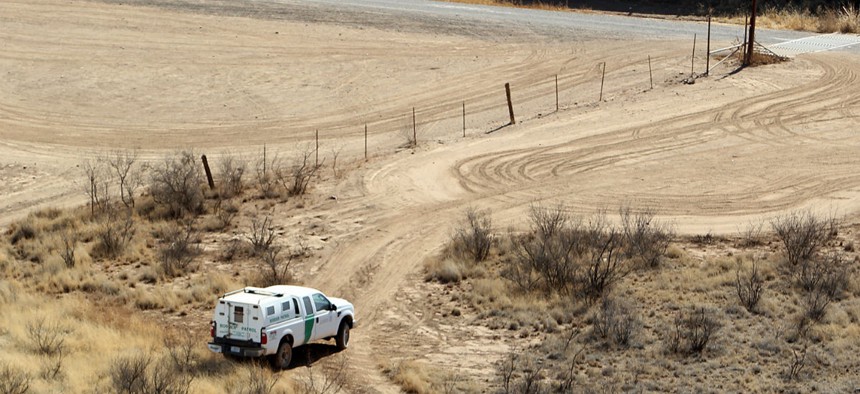
Donna Burton / CBP file photo
DHS Scales Back Troubled Contract Designed to Bring on More Border Agents
Agency makes adjustment after contractor brought on 0.2 percent of anticipated hires.
The Trump administration is scaling back a $300 million contract it signed a year ago to help fulfill the president’s mandate to hire thousands of Border Patrol agents, customs officers and support staff, saying it now has sufficient resources to make those hires internally.
Customs and Border Protection confirmed the realignment after Government Executive reported last month that Accenture, the vendor on the contract, had only made 15 of its goal of 7,500 hires and as the Homeland Security Department’s inspector general released a “management alert” calling on on CBP to “address serious performance issues” on the agreement. The IG found that Accenture has “not provided the promised hiring process or results” despite already receiving $13.6 million, and had relied upon existing CBP resources to fulfill its contract obligations. The firm had only helped CBP bring on two employees by Oct. 1, the IG said.
CBP had obligated $43 million to Accenture, as of late November.
“In its first year, CBP’s contract with Accenture has already taken longer to deploy and delivered less capability than promised,” the IG said. “Accenture is nowhere near satisfying its 7,500-person hiring goal over the next 5 years.” Because the contractor used CBP resources, the auditors added, the agency may have “paid Accenture for services and tools not provided.”
CBP issued the contract to help fulfill President Trump’s mandate that the agency hire 5,000 new Border Patrol agents, which he issued through executive order shortly after taking office. Accenture was tasked with onboarding those 5,000, plus an additional 2,000 customs officers and 500 air and marine officers. Accenture gets paid on a per-hire basis, most of which comes when CBP sends an offer letter to a candidate and the remaining amount when the employee actually starts working.
A CBP spokesperson said the agency has “coordinated with Accenture” in asking them to “reduce emphasis on some elements of the contract” so it can focus on its other responsibilities. The agency no longer needs help processing candidates, the spokesperson said, adding that it does not want Accenture to “compete with CBP” for “limited resources” such as polygraphists.
“At this point, we have adequate capacity within our government hiring center to process the number of applicants we have—so it is inefficient to have Accenture do processing when our government personnel have excess capacity,” the spokesperson said. The official added that CBP thinks “it makes more sense for CBP to manage the prioritization.”
While Accenture will no longer play a significant role in the actual onboarding of new employees, the spokesperson explained, it will continue to rely on the contractor for marketing, advertising, applicant care and data analytics support.
“We are asking Accenture to continue effort in those areas while we continue to assess what, if any, more permanent changes to the contract might be appropriate,” the spokesperson said.
The inspector general, meanwhile, described the need to adjust the contract in more blunt terms.
“Without addressing the issues we have identified, CBP risks wasting millions of taxpayer dollars on a hastily approved contract that is not meeting its proposed performance expectations,” the IG said. “CBP must hold the contractor accountable, mitigate risk, and devise a strategy to ensure results without additional costs to the government.”
The auditors noted that CBP had already adjusted the contract to remove some of Accenture's obligations, but that did not result in reducing how much the vendor would be paid.
Didi Blackwood, a spokeswoman for Accenture, declined to answer questions, referring them back to CBP.
"We remain focused on fulfilling our client’s expectations under our contract," Blackwood said.
CBP has long struggled with hiring and retaining employees. In fiscal 2017, Border Patrol hired just 1.36 percent of applicants—a rate that has increased threefold since fiscal 2015. Hiring ticked up in fiscal 2018, but the agency still saw a net loss of 76 agents in the first half of the year. It has sped up the hiring process through a series of reforms to the polygraph process, physical testing and new authorities from the Office of Personnel Management, but it still took 274 days to bring on a new agent in fiscal 2017. More than three out of four applicants still fail their polygraph, and Border Patrol currently employs 7,000 fewer agents than the figure Trump mandated.
CBP has yet to fill 2,000 customs officer jobs Congress authorized in 2014. Tony Reardon, president of the National Treasury Employees Union, called the contract a "boondoggle" that is wasting money that should be otherwise spent on hiring those officers.
"Time and time again we see taxpayer money unwisely prioritized and committed to outside contractors with little guidance and supervision, while the permanent workforce is starved of resources," Reardon said.
Trump has also called on Immigration and Customs Enforcement to hire 10,000 new deportation officers, tripling its current numbers. ICE solicited a similar contract for help in bringing on 26,000 new employees, but subsequently canceled it due to delays in receiving adequate funding. The administration said it would re-solicit the contract in the first quarter of fiscal 2019, but has yet to do so.
This story has been updated with additional comment.







